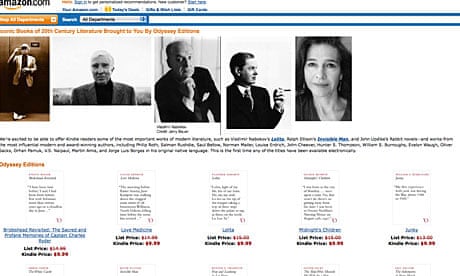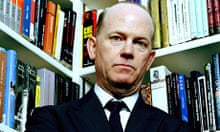Fear and loathing among the movers and shakers of America's publishing industry have reached new heights with both Random House and Macmillan denouncing the literary agent Andrew Wylie's move into digital publishing.
Home to 700 authors and estates ranging from Philip Roth to John Updike, Jorge Luis Borges and Saul Bellow, the Wylie Agency shocked the publishing world yesterday when it announced the launch of Odyssey Editions. The initiative has been set up to sell ebook editions of modern classics – including Lolita, Fear and Loathing in Las Vegas and Updike's Rabbit tetralogy – exclusively via Amazon's Kindle store, leaving conventional publishers out of the picture.
The move provoked an immediate reaction from Random House, which publishes in print several of the authors involved with Odyssey Editions. The publisher fired off a letter to Amazon "disputing their rights to legally sell these titles", which it said were "subject to active Random House publishing agreements".
It went further, threatening that "on a worldwide basis", it "will not be entering into any new English-language business agreements with the Wylie Agency until this situation is resolved". It said the agency's decision to sell ebooks exclusively to Amazon "for titles which are subject to active Random House agreements undermines our longstanding commitments to and investments in our authors, and it establishes this agency as our direct competitor."
A Random House spokesman, Stuart Applebaum, told the Guardian that the severing of relations with Wylie would relate only to new book deals, while titles already in the pipeline would still go ahead. He accepted there was a risk involved for Random House, but argued that the stakes were higher for Wylie and his authors who would potentially lose a lucrative outlet for their work.
"It is not a decision that Random House reached lightly, but one that is unanimously agreed by our senior publishing colleagues in the US, Canada and the UK," Applebaum said.
Wylie's impressive client roster – which includes Martin Amis and Salman Rushdie as well as the estates of Hunter S Thompson, Norman Mailer and Evelyn Waugh – makes this a huge step for Random House, but one the publisher clearly felt was necessary.
At issue is who holds digital rights in older titles published before the advent of ebooks. Publishers argue that the ebook rights belong to them, and authors and agents respond that, if not specifically granted, the digital rights remain with the author.
There is also a dispute over the royalty that should be paid for ebooks: authors believe they should be getting up to double the current standard rate of 25%, because ebooks are cheaper to produce than physical editions.
As yet, none of the authors involved with Odyssey Editions have commented on the move, but Susan Cheever – whose father John Cheever's stories are in the initiative – said he would have been "torn".
"He was a tremendously loyal man who famously stayed at the New Yorker even when they weren't doing right by him," she told the Associated Press. "He had very good feelings about Knopf and Random House, with good reason. But in principle, I'm all for writers getting the largest percentage possible for their work."
Macmillan's US chief executive, John Sargent, hit out at Wylie's move, saying he was "appalled" by the two-year deal with Amazon, which he felt "empowers the dominant player in the market to the detriment of their competitors and creates an unbalanced retail marketplace".
"It is an extraordinarily bad deal for writers, illustrators, publishers, other booksellers, and for anyone who believes that books should be as widely available as possible. This deal advantages Amazon, which already has the dominant share in this market," Sargent wrote on his blog.
"Independent booksellers across the country are making plans to launch their e-bookstores this fall. Now they will not have these books available and Amazon will."
Andrew Wylie could not be reached for comment by the Guardian today, but he told the New York Times he had been taken by surprise by Random House's statement and had not yet decided how to respond. "I'm going to think about it a little bit," he said. "We take it seriously, as do the authors we represent. This area of discussion and negotiation needs to be resolved."





